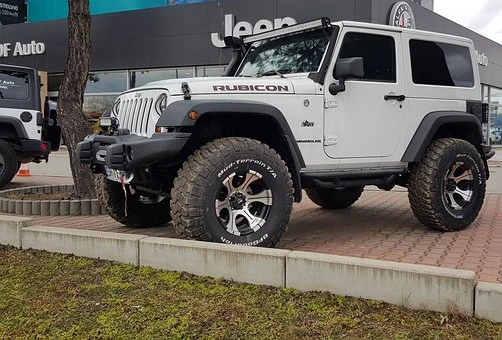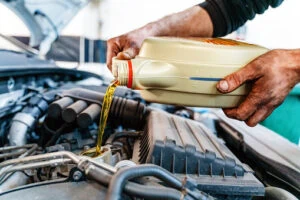Jeep Wrangler oil type is critical for any engine vehicle, and it is required for the engine to function properly. To keep everything moving smoothly, every car needs oil. That being said, there are a lot of different automotive oils on the market, so finding the proper one might be difficult. Specific cars require specific types of oil, as previously stated. So, what is the jeep wrangler oil type?
Today, we’re here to help you choose the finest Jeep Wrangler oil type. We provide high-quality oils for all types of cars, trucks, and SUVs. The Wrangler is a fantastic vehicle without a doubt, but it must be used with the appropriate oil for optimum performance. Today, we’ll go over the best oils for specific versions of the Jeep Wrangler and address several of your most pressing concerns.
We’ll go through all aspects of the Jeep Wrangler Oil type, as well as a complete breakdown of this crucial engine component and what kind of oil is used in all current and previous Jeeps.
Let’s get started!
The Jeep Wrangler Oil Type Terminology And Common Ideas
Let’s start off by going back to the fundamentals and discussing this frequently misunderstood component. Engine oil is designed to lubricate internal metal components of your Jeep Wrangler engine, reducing friction and dissipating heat.
Why should we be concerned about friction? Over time, heat generated from friction will have a significant impact on the lifespan of your Wrangler’s engine components.
Because of the nature of its formulation. The engine oil also aids decrease contention with lubrication additives. Moreover, it helps to keep your inner engine components cool by transmitting warmth to oil. Keeping your Jeep’s engine cool while offroading is critical when performing demanding tasks like climbing steep hills or navigating rough terrain.
Next, we have some of the phrases you’ll need to know as we go through Jeep Wrangler oil type.
Viscosity And Oil Weight
Let’s take a look at how viscosity affects the performance of various engine oil types. 10 is the viscosity of the oil at low temperatures, while thirty is actually the viscosity rate of oil at comparatively high temperatures. The less viscosity, the thinner the oil will appear. Less or more viscosity does not always imply that the oil is superior or inferior to your car’s engine.
Conventional And Synthetic
Both conventional and standard oil have their origins in straight-up crude oil. A crude oil base with extra chemicals, cleaners, and the like added on is used in conventional oil.
Synthetic oil is a blend of precisely chosen crude oil molecules that are tailored to improve lubrication, as well as additives, detergents, and other chemicals. Synthetic oil has consistently outperformed conventional petroleum in every test.
Jeep Wrangler Oil Type Based On Mileage
When it comes to engine oil, it’s critical to keep in mind that it must be the correct type for the car, whether it’s a Jeep Wrangler or otherwise. For example, some engine oils are intended for newer engines with fewer miles on them and are meant to boost performance.
There are also several engine oils available for vehicles with a lot of miles on them that are meant to improve engine protection and extend engines’ lifespans. Let’s have a look at the recommended oil for the 2017 Jeep Wrangler in detail.
Does Jeep Wrangler Need Synthetic Oil?
It is not required. However, it is recommended.
The Generations Of Wrangler
We’ll go through each engine available in all Wrangler generations, from the JL to the YJ:
- Y-J 1986 to 1995
- T-J 1996 to 2006
- J-K 2006 to 2018
- J-L 2018 until Present
‘Either or’ is mentioned on TJ and YJ Wranglers. When do you choose one over the other? Here’s when it gets ugly: “It depends” is the answer we’ve all heard a million times before.
When Should I Use A 10W-30 Oil Vs A 5W-30 Oil?
‘Either or’ is mentioned on TJ and YJ Wranglers. When do you choose one over the other? Here’s when it gets ugly: “It depends” is the answer we’ve all heard a million times before.
When You Can Use 10w30
On the other hand, if you live in a cold location where there is frequently freezing weather or if your Wrangler is operated in the summer months, then 10W-30 is a superior choice. 5W-30 is a medium weight, multi-purpose extreme pressure synthetic oil that can tackle severe conditions. The viscosity at startup of 5W-30 is greater (thicker) than 10W-30 and is a good substitute for lower temperatures where cold does not become an issue. 10W-30 will take longer to warm up and will produce less flow at lower temperatures, which can cause engine wear to occur sooner than necessary.
When You Can Use 5w30
If you live in a location where the weather is unpredictable, with warm summer days and ice-cold winter nights, or if your automobile’s engine isn’t running at optimum efficiency due to excessively cold temperatures; you’ll want to use 5W-30 oil in your Jeep Wrangler.
When temperatures drop below freezing, this thinner viscosity oil will warm up faster and move to important engine components more readily. When it’s chilly outside, go for the 5W-30.
Can I Use 5w30 Instead Of 5w20 Jeep Wrangler?
Yes! You can use 5w30 instead of 5w20 jeep wrangler.
What Kind Of Oil Does A 3.6 Jeep Take?
It takes 5w-20 jeep oil.
Best Wrangler Jeep Oil Type
Clean oil is the finest oil for your Jeep Wrangler. Regardless of type, whether it’s full synthetic or conventional oil, it’s all the same. The frequency of changing the oil remains unchanged. It doesn’t imply that you can extend your oil change intervals if you use a more expensive, premium oil brand.
Sure, synthetic oil may be said to last longer than conventional oil in theory, but it is still contaminated at the same rate as normal oil. With that in mind, because of the reasons stated above, motor oil change intervals should be equal for conventional and synthetic oils.
Bottom Line
When it comes to putting oil in your Wrangler, most people feel that any sort of oil will do. You’ll need an excellent oil that can endure harsh weather conditions while also decreasing engine sludge and preserving fuel efficiency, regardless of the type or condition of the oil itself. Even if they cost a bit more to operate in your Wrangler, we always recommend using a synthetic blend.
Modern engines, on the other hand, are built to run low viscosity oil that is highly effective in protecting your engine while also providing excellent fuel efficiency. This article will assist you in putting the correct engine oil in your automobile, regardless of which Wrangler you’re driving down the road.


